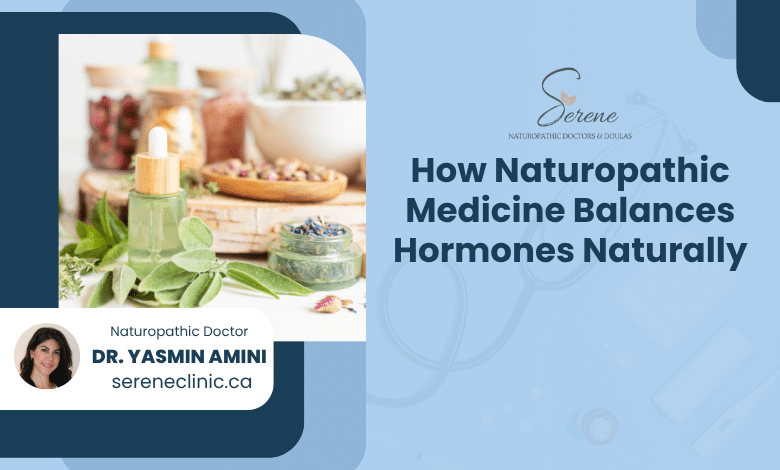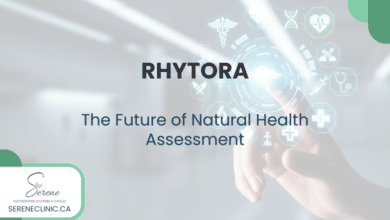How Naturopathic Medicine Balances Hormones Naturally

Abstract:
Hormonal imbalances are a growing concern, affecting individuals across various stages of life. From adolescents to menopausal women, hormonal disruptions can lead to a wide range of symptoms, such as fatigue, acne, weight gain, and mood swings. These imbalances are often dismissed or poorly understood, which can delay the necessary interventions. In response to this, naturopathic medicine offers a holistic approach to balancing hormones naturally. This approach, focusing on root causes rather than just symptoms, involves several key strategies that aim to restore balance within the body, leveraging evidence-based therapies that promote overall health. Serene Clinic, for instance, emphasizes a comprehensive, personalized care approach to hormone restoration through lifestyle modifications, nutrition therapy, herbal supplementation, and more. This article explores the primary causes of hormonal imbalances, the naturopathic approach to treatment, and how these natural methods contribute to sustainable hormonal harmony.
Serene Clinic Best Naturopath in Toronto Book Your Free Consultation Today
Introduction:
Hormonal imbalances have become a widespread concern, particularly among women. From the onset of menstruation through to perimenopause and beyond, women experience fluctuating hormone levels that can significantly affect their physical and mental well-being. However, the understanding of these imbalances often lacks depth, and as a result, symptoms are commonly misunderstood or underappreciated. This article delves into how naturopathic medicine approaches these imbalances with a holistic mindset, offering natural, scientifically-backed solutions to restore equilibrium to the body’s hormone levels. If you’re looking for a Naturopathic doctor in Toronto or a Naturopathic doctor near me, Serene Clinic provides tailored, expert care to restore your hormonal balance.
Serene Clinic Holistic Doctor Toronto. Book Your Free Consultation Today
What Causes Hormonal Imbalances?
Hormonal imbalances can arise from various factors, many of which are interconnected. Common causes include:
-
Chronic Stress: When under constant stress, the body produces excess cortisol, a hormone that, in high levels, can disrupt the balance of other hormones such as estrogen and progesterone.
-
Poor Sleep: Sleep disturbances can significantly affect hormonal regulation. For example, insufficient sleep may reduce melatonin levels, which in turn can interfere with the production of other hormones like cortisol.
-
Blood Sugar Imbalances: High blood sugar or insulin resistance can lead to the imbalance of estrogen, progesterone, and testosterone.
-
Endocrine Disruptors: Chemicals in the environment, such as BPA and pesticides, can mimic or interfere with hormone function.
-
Gut Health Issues: The gut microbiome plays a critical role in hormone metabolism. An unhealthy gut may contribute to issues such as estrogen dominance.
-
Nutrient Deficiencies: Deficiencies in key nutrients such as magnesium, vitamin D, and omega-3 fatty acids can impair hormonal production and function.
By understanding these root causes, Naturopathic doctors can offer solutions that address the underlying issues rather than merely masking symptoms.
Serene Clinic Naturopathic Doula Book Your Free Consultation Today
The Naturopathic Approach to Hormonal Balance:
Naturopathic medicine is a comprehensive, evidence-based approach that targets the root causes of hormonal imbalances. Below are some of the core methodologies naturopathic practitioners use to help restore hormonal balance naturally.
1. Comprehensive Testing:
Naturopathic practitioners utilize various diagnostic tools to get a clear picture of a patient’s hormonal health. These may include:
-
Bloodwork: This is used to measure levels of various hormones, including estrogen, progesterone, cortisol, and thyroid hormones.
-
DUTCH (Dried Urine Test for Comprehensive Hormones): The DUTCH test provides a detailed analysis of hormone metabolites and offers insights into how well hormones are being metabolized.
-
Thyroid Panels: A complete thyroid panel, including tests for TSH, free T3, free T4, and antibodies, is essential for understanding thyroid function, which is directly linked to hormonal health.
These tests enable practitioners to personalize treatment strategies based on the individual’s hormonal needs.
2. Lifestyle Optimization:
Naturopathic medicine recognizes that lifestyle factors greatly influence hormone health. As such, practitioners recommend the following:
-
Sleep Hygiene: Ensuring adequate, restful sleep is critical for hormone regulation. Techniques such as meditation, reducing screen time before bed, and creating a calming bedtime routine can help improve sleep quality.
-
Stress Management: Practices like yoga, meditation, deep breathing exercises, and mindfulness can significantly reduce cortisol levels and promote hormonal harmony.
-
Exercise: Regular physical activity can help balance hormones like insulin and cortisol while supporting overall metabolic health. Tailoring the type of exercise to the patient’s cycle, such as gentle exercises during menstruation or more intense workouts in the follicular phase, is a key component of naturopathic care.
3. Nutrition Therapy:
Nutrition plays a pivotal role in supporting hormonal balance. Naturopathic doctors emphasize:
-
Balancing Blood Sugar: Stable blood sugar levels are crucial for maintaining hormone levels. Eating whole foods, avoiding refined sugars, and focusing on complex carbohydrates can help regulate insulin and cortisol production.
-
Supporting Liver Detox: The liver is responsible for detoxifying excess hormones, including estrogen. Foods that support liver function, such as cruciferous vegetables (e.g., broccoli, cauliflower), green tea, and turmeric, are essential in any hormone-balancing regimen.
-
Removing Inflammatory Foods: Foods that contribute to inflammation, such as processed foods, trans fats, and high levels of sugar, should be minimized to help prevent hormonal imbalances and related symptoms.
4. Herbal & Nutritional Supplements:
Naturopathic medicine often uses herbal and nutritional supplements to directly impact hormone regulation:
-
Herbal Supplements: Herbs like maca root, ashwagandha, and vitex (chaste tree berry) are commonly used to help regulate estrogen and progesterone levels. Maca, for example, is known to help balance hormones during menopause and perimenopause.
-
Nutritional Supplements: Nutrients such as vitamin D, magnesium, and omega-3 fatty acids are vital for hormonal health. Magnesium helps regulate cortisol levels, while vitamin D supports the immune system and hormone production. Omega-3 fatty acids, found in fish oils and flax seeds, help reduce inflammation and balance estrogen levels.
5. Gut and Liver Support:
The connection between gut health and hormone regulation is critical, particularly for estrogen metabolism. Naturopathic medicine aims to improve gut health through:
-
Healing the Gut Lining: Conditions like leaky gut can contribute to systemic inflammation and hormone imbalance. Incorporating probiotics, prebiotics, and anti-inflammatory herbs helps promote gut healing.
-
Supporting Estrogen Metabolism: By improving gut function, the body can better metabolize and eliminate excess estrogen, which can otherwise contribute to conditions like estrogen dominance.
Why Choose Naturopathic Medicine for Hormonal Health?
The benefits of a naturopathic approach to hormonal balance are vast:
-
Personalized Care: Each treatment plan is tailored to the individual, taking into account their unique lifestyle, diet, health conditions, and test results.
-
Holistic Focus: By addressing the root causes of hormonal imbalances, naturopathic medicine offers a more comprehensive, long-term solution compared to conventional methods, which often focus solely on symptom relief.
-
Sustainable Results: Naturopathic treatments aim to restore balance to the body’s systems naturally, leading to sustainable hormonal health without reliance on synthetic medications.
Conclusion:
Hormonal imbalances can significantly impact quality of life, but they are not a hopeless condition. Naturopathic medicine offers a natural, comprehensive approach to restoring hormonal balance, emphasizing lifestyle changes, nutrition therapy, herbal supplementation, and gut and liver support. By addressing the root causes of imbalances, individuals can find relief from symptoms and restore their hormonal health in a sustainable way. At Serene Clinic, our dedicated practitioners are ready to assist individuals from all walks of life, providing personalized care for women seeking hormonal harmony, both through in-person consultations and virtual appointments. Whether you’re searching for a Naturopathic doctor in Toronto or a Naturopathic doctor near me, our team is here to help you on your journey toward balanced health.
Serene Clinic Naturopathic Medicine Book Your Free Consultation Today
Connect with a Naturopathic Doctor and Doula near you, whether you are in Toronto or anywhere in Ontario.
Serene Clinic Naturopathic Doctors Book your complimentary meet and greet with an Ontario licensed Naturopathic Doctor and Doula:
https://sereneclinic.janeapp.com
This article is for informational and educational purposes only and is not intended as a substitute for medical advice, diagnosis, or treatment. Always seek the advice of your physician or other qualified health care provider with any questions you may have regarding a medical condition.
Frequently Asked Questions
Hormonal imbalance occurs when there is too much or too little of a hormone in the bloodstream, leading to symptoms such as fatigue, mood swings, weight gain, and acne.
Common causes include chronic stress, poor sleep, blood sugar imbalances, inflammation, endocrine disruptors, gut health issues, and nutrient deficiencies.
Naturopathic medicine takes a holistic approach, using lifestyle optimization, nutrition therapy, herbal supplements, and comprehensive testing to address the root causes of hormonal imbalances.
Eating a nutrient-dense, whole foods diet, managing stress, getting quality sleep, and regular movement (like walking, strength training, or yoga) can all support hormone balance. Reducing alcohol, sugar, and exposure to endocrine disruptors (like plastics and synthetic fragrances) also helps regulate hormones naturally.
Nutrition therapy helps by balancing blood sugar, supporting liver detox, and removing inflammatory foods, which can all influence hormone regulation.
Yes, and this is individual! There is an array of herbal medicines that can balance hormones, depending on the system and symptoms. Our Naturopathic Doctors at Serene Clinic create plans for patients based on their unique cases.
Gut health is critical for estrogen metabolism. An unhealthy gut can disrupt hormone levels, so improving gut function is essential for restoring hormonal balance.






